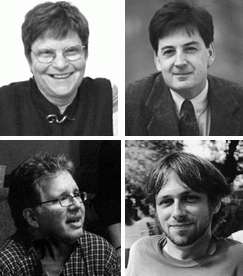Among organizations hit hardest during the post-9/11 era, in which funding for the arts has been sharply curtailed, literary nonprofits are struggling to simultaneously serve their missions and remain solvent. Despite the economic downturn, two nonprofit organizations—Milkweed Editions, a small press based in Minneapolis, and the St. Mark's Poetry Project in New York City—have maintained financial stability, but more challenges lie ahead: The directors of both organizations, Emilie Buchwald and Ed Friedman, recently retired.

Buchwald, cofounder of Milkweed, retired in May after nearly 25 years as its publisher. Friedman, artistic director of the Poetry Project, left his position, which he held for 16 years, at the end of June.
Filling the vacancy left by Buchwald is H. Emerson Blake, the former executive editor of Orion magazine, a national literary and arts magazine published by the nonprofit Orion Society. Blake was named Milkweed's editor in chief, and will share leadership of the press with managing editor Hilary Reeves. There will be no publisher.
Milkweed is one of the largest nonprofit literary presses in the country, with more than 115 books of poetry, fiction, nonfiction, and criticism in publication. Buchwald, who cofounded the press with artist and book designer Randy Scholes in 1979, says Milkweed's transition from "a founder-run organization to a more mature institution" couldn't come at a better time, because the last few years have been successful ones for the press. (She boasts that there are 1.5 million Milkweed books in print, and that last year the press paid over $100,000 in royalties to its writers.)
"I've seen organizations go through this process when the founder gets sick or dies, and it's a mad scramble," Buchwald says. "I didn't want that. I wanted a very smooth, orderly transition while everything was at an optimum level."
According to Friedman, it's a good time for a changing of the guard at the Poetry Project too. Friedman, who became the organization's artistic director in 1987, says it has achieved a level of stability that will ease the transition to the new director, Anselm Berrigan. The Poetry Project has approximately 600 paying members and receives funds from the NEA, the New York State Council on the Arts, and other public and private donors.
Founded in 1966 by Paul Blackburn, the organization offers several weekly reading series and a program of writing workshops, and publishes a quarterly newsletter and the literary magazine the World. It also holds a significant audiotape archive of poetry readings and related events.
While his departure has much to do with "being the father of a three-and-a-half-year-old and wanting to actually have some time with him," Friedman says the organization needs to grow with today's new, larger generation of poets, who look to it for a sense of community. "There are just many, many more poets showing up in New York," he says. "I think that generations have to sort these things out, and where I can do it from the standpoint of someone who is fifty-three, it would be nice to have someone younger in the job."
Berrigan, a poet who grew up ensconced in the downtown New York poetry scene (his parents—the poets Ted Berrigan, who died in 1983, and Alice Notley, who now lives in Paris—were active in the community), agrees that more people are turning to poetry, and at a younger age.
"One of the things I want to do is just make sure that the Project grows along with the community, that it remains open to all the different circles of poets in New York and in the country," he says. "One of the things that's nice about the Project is that people feel connected to it and want their opinions to be heard, so one has to be open and attentive to anybody who comes to the door with a question or an idea."
Despite the current economic challenges that face a literary nonprofit, this kind of idea-based organization is, according to Milkweed's Blake, playing one of the most vital roles in people's lives in the aftermath of September 11. "Nonprofits are providing ideas, information, and manners of thought that are most needed in our culture right now," he says. "The nonprofits that are succeeding are the ones that realize that if they find a way to put their foot forward, they can take advantage of a moment of extreme transition in our culture."
Berrigan believes that a literary nonprofit like the Poetry Project is an important example of an organization with "a principle that isn't just about the bottom line." Although Berrigan and Blake are acutely aware of the trajectory of the nation's economy, and what that means for the Poetry Project and Milkweed, both have answered the call to lead their organizations and provide what Blake believes people want now more than ever.
"People at this moment in time are trying to find a new kind of meaning in their lives," Blake says, "and they know instinctively that literature is one of the places to look for that meaning."
Kevin Larimer is associate editor of Poets & Writers Magazine.








